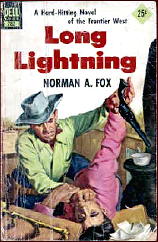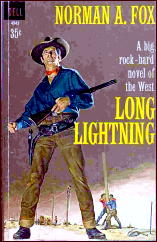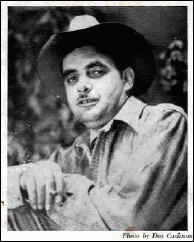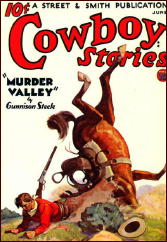Fri 7 Sep 2012
Archived Western Review: NORMAN A. FOX – Long Lightning.
Posted by Steve under Pulp Fiction , Reviews , Western Fiction[9] Comments
NORMAN A. FOX – Long Lightning. Dodd Mead, hardcover, 1953. Dell 783, paperback, 1954; several later printings. First published as the short novel “Wire to Warlock,” Zane Grey’s Western Magazine, December 1952.

For those of you always on the lookout for hard-boiled fiction to read, and you have no a priori objections to reading a western, here’s one you might want to hunt down. There are some solid “tough guy” aspects to this 50-year-old novel that may be worth your attention, largely due to the highly individualistic nature of its main protagonist, Holt Brandon, construction chief for the Mountain Telegraph Company. In this book, not only must he get the job done on time, but he has to fight for his life all the while he’s doing so.
There are two obstacles, the first being Mountain’s main competitor, Consolidated, and they do not hesitate in hiring local gunmen to make sure Holt’s crew do not make their deadline. Second, and not insignificantly, is Colonel Templeton, the owner of the Montana land they must cross, an elderly gentleman from the South who imagines that the War Between the States is still going on, and still fighting imaginary battles in his mind.

Holt Brandon plays his cards strictly by the book, and his loyalty to his boss, Sam Whitcomb is never in question. The world of financial matters is beyond him, but what he’s fully aware of is this: If they do not get the wires strung to Warlock from Salish on time, all is lost for Mountain Telegraph.
Here’s a quote that demonstrates that Fox knew exactly what he was writing about, from page 113:

Poles are late in arriving, and the crew sent to fetch them reports a brush with hidden marksmen who keep them busy with guns when they should have been using axes. The wire stringers stand idle that day. The long lightning is flung from camp to town, shouting always for more supplies, more men, and you hammer the key constantly and wish that Sam Whitcomb were up and about and doing the job at the other end.
To add some variety to the plot, Holt is not shy around women, but he is caught by surprise when he finds himself the focus of attention of two of them: Gail, the daughter of his boss, and Ellen Templeton, the colonel’s daughter. It is clear which of them he will end up with, if either is to be the case, but that he will lose both of them is a definite possibility, and what Fox does is make sure the reader does not lose sight of that.
So — here’s a western that’s a trifle clumsy when it comes to affairs of the heart, perhaps, but not– ever — when it comes to matters of loyalty and pride, and other qualities that men have, or they’re supposed to.
July 2004 (slightly revised).

[UPDATE] 09-07-12. I’ve made no attempt to obtain an exact count of the western novels written by Norman Fox (1910-1960), but if he’d been able to live longer, I’m sure he’d have written a lot more than the roughly 30 or so I’ve quickly come up with.
He was a pulpster as well, with nearly a full page of entries already listed for him in the online FictionMags index, a list still under construction. The first of these, by the way, is “The Strange Quest” (Cowboy Stories, June 1934).
The photo of him comes from the back cover of one the hardcovers I own by him. What’s unusual about it is that it was taken by fellow western and adventure writer, Dan Cushman. I’d love to know more about when, where and why.
September 7th, 2012 at 7:25 am
There is a great website about Norman A. Fox that I have visited a few times: http://www.normanafox.com. It covers his life, photos, lists his stories and novels. Mentions movies based on his work, etc. Appears he was a full time writer and made a good living at it until dying of cancer at an early age.
September 7th, 2012 at 10:06 am
An interesting story at the website. None of the films are stand outs, but all have plenty on the ball. Tall Man Riding, with a little more care could have been exceptional. I thought Night Passage the weakest.
September 7th, 2012 at 11:31 am
Thanks for the link to the Norman Fox website, Walker. As Barry says, it’s very interesting and informative, a lot more so than many author-oriented sites.
It turns out that the story in COWBOY STORIES was not Fox’s first published story, only his third, but the first two (the same year) were published in LIMELIGHT and GRIT, neither of which were pulps.
My rough count of the books he wrote was close. From the site: “Norman had thirty one hard cover novels and two short story collections published.” There are cover images for all of them, including what appears to be all of the paperback editions.
I agree with Barry about TALL MAN RIDING, but with Randolph Scott as the star, it almost goes without saying.
The other two movies based on Fox’s work are GUNSMOKE (based on ROUGHSHOD) and THE RAWHIDE YEARS.
From the long and detailed story of his life, the following caught my eye:
“In 1939, however, he could not resist making a wager with a writer friend, rumored to be fellow Montana author Dan Cushman….”
The photo of Fox that I used can also be found in this online bibliography.
He died far too early of pancreatic cancer.
September 7th, 2012 at 9:27 pm
Several of Fox’s short stories are online at a rather quirky website that has a lot of old pulp and fiction magazines scanned and loaded.
http://www.unz.org/Pub/AllPeriodicals?View=Search
September 7th, 2012 at 9:46 pm
Shay
Thanks for this! I knew of the site, but I didn’t realize that they had it set up so well you can search for individual authors. I found seven stories by Fox, one from Collier’s, the other six from western pulps.
Does anyone know if new scans are going to be added as time goes along, or is what’s there all we’re going to get?
September 8th, 2012 at 5:44 pm
Well…it’s the online home of an archive belonging to someone named Ron Unz. Let’s hope he keeps adding to it.
Then again, I spend far too much time there as it is. My only quibble with the site is that I haven’t figured out how to download anything but individual pages. Of course, it could have deliberately been set up that way, but it chains me to my computer as opposed to an e-reader.
September 11th, 2012 at 9:33 am
Hello all, I am the proprietor of the Norman Fox website and was directed to this blog by a fan in New Zealand. Thanks for the kind words about the web site, Walker. I writing to let you know that I am working to get Norman’s works onto the website and/or the Gutenberg site. So hopefully within the next year there will be some Norman stories and novels available there. In the meantime, Norman would love to know that his works continue to be enjoyed by this group.
-BarryF
BTW, I agree on the movies. “Night Passage” seemed to be an endless repetition of Jimmy Stewart singing about trains.
September 11th, 2012 at 11:40 am
Barry
I appreciate the chance to tell you directly how well-designed and useful your Norman Fox website is. Fox died too early to be remembered as much as Zane Grey, Max Brand or Louis L’Amour are, but I’ve impressed by all of the books by him I’ve read. (Too few of them, I’m sorry to say.)
— Steve
September 11th, 2012 at 12:38 pm
Yes, Steve is right about the Norman Fox website. It is very useful and easy to navigate. I wish all the pulp and paperback writers had similar sites devoted to them.